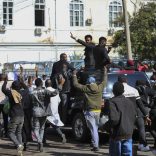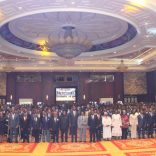Marcelo Rebelo de Sousa at the celebrations of Mozambique's 50th anniversary of independence
Election of governors insufficient to end political conflicts in Mozambique – analysts

In file CoM
The election of governors in Mozambique as of this year, the result of an agreement between the government and the opposition, will be insufficient to guarantee peace if irregularities persist in the elections, analysts told Lusa on Monday.
“The legislation, as it stands, seems to be postponing the problems concerning peace which reside in the elections, academic and executive director of the Development and Society Association, Adriano Nuvunga, told Lusa during public consultations on the decentralisation package.
The Mozambican National Resistance (Renamo) hopes to govern some of Mozambique’s 11 provinces thanks to the new law, whose progressive decentralisation, agreed as part of a new peace agreement, also foresees the election of administrators in the 161 districts from 2024.
Governors and administrators will no longer be appointed by central government but will be drawn from the largest party in the respective provincial or district assembly.
However, irregularities in the local elections in October 2018 show that the country’s political and military conflicts stem from suspicions of electoral fraud, leading to the challenging of results, Nuvunga told Lusa.
Nuvunga cites the misrepresentation of the results of the second round of the municipal elections in Marromeu, a municipality in central Mozambique, as an example, where the Mozambican Liberation Front (Frelimo) won but was challenged in a spat which reached even into the diplomatic milieu, with the US embassy in Mozambique issuing a statement recommending the revision of “electoral rules and procedures” to increase “transparency and legitimacy” before the 2019 elections.
“The structuring of this legislation has been hastened without proper reflection, and especially without a deep understanding of the problems that hinder peace in Mozambique,” Nuvunga told Lusa.
Ericino de Salema, a lawyer and Mozambique director of the Electoral Institute for Sustainable Democracy in Africa (EISA), also feels that the election of governors and administrators, in itself, will not remove the risk of the country experiencing further conflict.
Salema understands that, due to lack of clarity, the draft law deposited in the Assembly of the Republic has the potential to create a lack of coordination between the provincial governors-elect and the future Secretaries of State, a figure created by the new legal package.
On the one hand there is decentralisation of powers. On the other, the central power now appoints this new figure, which assumes several powers itself.
“Decentralised bodies which do not belong to the same political family as the central government may feel frustrated, and this could be a source of controversy or even conflict,” he said.
Ericino de Salema argued that the decentralisation process should prevent un-elected functions such as the secretary of state from interfering with the exercise of powers of elected bodies.
“The role of the central government at the local level of the district is important and it is important for it to be clear, given that the state is unitary,” the director of EISA in Mozambique said.
But Paulo Comoana, a professor and counsellor judge at the Administrative Tribunal, plays down fears about the conflict between local authorities and the central state authority, arguing that the Constitution “clearly delimits the competencies”.
The Mozambique Assembly of the Republic will discuss the decentralisation legislative package during the parliamentary session that runs until May.
This package includes the laws governing the operation of provincial decentralised governance bodies, the organisation and operation of provincial assemblies, the representation of the state in the province, and state oversight over decentralised entities.
The decentralisation package comes under the framework of agreements between the Mozambican president, Filipe Nyusi, and the former leader of the Mozambican National Resistance, Afonso Dlhakama, with a view to signing a peace agreement for the country.












Leave a Reply
Be the First to Comment!
You must be logged in to post a comment.
You must be logged in to post a comment.